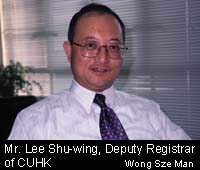December 1998
Mainland Students studying at CUHKBy Wong Sze Man
Last September, 28 mainland students came to
The Chinese University of Hong Kong to receive
tertiary education.
A total of 150 mainland students will study at local
universities in the coming academic year.
CUHK implemented this system one year earlier than other
tertiary institutions.
The Deputy Registrar of CUHK, Mr. Lee Shu-wing explained:
"We let them come this academic year for our system is comparatively more flexible.
Because our system is credit-based, many courses can be offered
to mainland students. As a result, we do not need to open any new courses for them."
The University can offer two percent of its quota to mainland
students.
All the students admitted must abide by regulations
governing admission to full-time undergraduate studies before they can study at CUHK.
They have to possess qualifications obtained outside
Hong Kong that qualify them for university admission in the People's Republic of China.
Besides, they must attain an acceptable level of
proficiency in both Chinese and English.
Mr. Lee said: "All these students are admitted by either
Beijing University or
Fudan University, so they are eligible to
study here.
The interviews for admission are conducted in Mandarin and
English so as to test their proficiency in English."
Continued he: "We also consider their performances in
university entrance examinations held in the Mainland.
Our selection criteria emphasize students' attitudes
towards learning, their analytical skills, as well as their commitment to study here."
There are three aims in this scheme: leading the
University to be more international, enhancing cultural exchanges within the campus, and
introducing competition among local students.
Cynthia Lam, a form seven student, thinks the scheme
can stimulate local students to work harder.
"As the number of places offered to local students
is reduced, the scheme may change local students' learning attitude, which I think is
a good thing,"she said.
On the other hand, Mr. Lee thinks the scheme would not bias
the mainland students.
Mainland students are required to take all compulsory
subjects like other local students do, for example, physical education. They have no
privilege over local students," said Mr. Lee.
"The number of mainland students is small. It's less than
one percent of the total number of students. As a result, local students will not be
affected much by the new scheme," added Mr. Lee.
In order to help Mainland students to adapt to the new
environment, the University provides numerous kinds of assistance for them which
include scholarships and counselling services.
One of the scholarship donors is the Hong Kong Jockey Club.
Starting from next year, the Hong Kong Jockey Club scholarship will cover all their
school fee and expenses.
This year, the students received scholarships from
private donations which are specifically for mainland students.
Apart from private donations, the Government also
subsidies them.
As Hong Kong is a completely strange place to
these students, we tend to provide a mentor to give them advice whenever
they need," Mr. Lee said.
Martin Xu Gu-yun, who came from Fudan University,
now majors in economics at CUHK. He thinks that the assistance provided is enough.
"The Senior Assistant Registrar of the Admission
Section and the hostel tutor will give us advice too," said Xu.
He had wanted to study law in Fudan University before
he came to HK.
Said Martin: "Though I cannot study law here,
I still wanted to come since I can learn different cultures and thinking methodologies.
Although the University does not offer all subjects
for us to choose, I do not think it is unfair," Xu added.
Mr. Lee explained why some subjects are not included in the
scheme : "We have invited all the departments to join the scheme,
but some of them had no response."
Besides, the students may not be qualified to study
certain subjects, like medicine," Mr. Lee said.
These students have to complete 123 credits
in four years, as they spend only six years in secondary school education.
Mainland students are required to take a Cantonese
course offered by the New Asia-Yale in China Language Centre.
Mr. Lee Shu-wing is not sure if the scheme will
continue in the future. "In fact, the implementation of this scheme depends mainly
on the funding,"he said.
|
